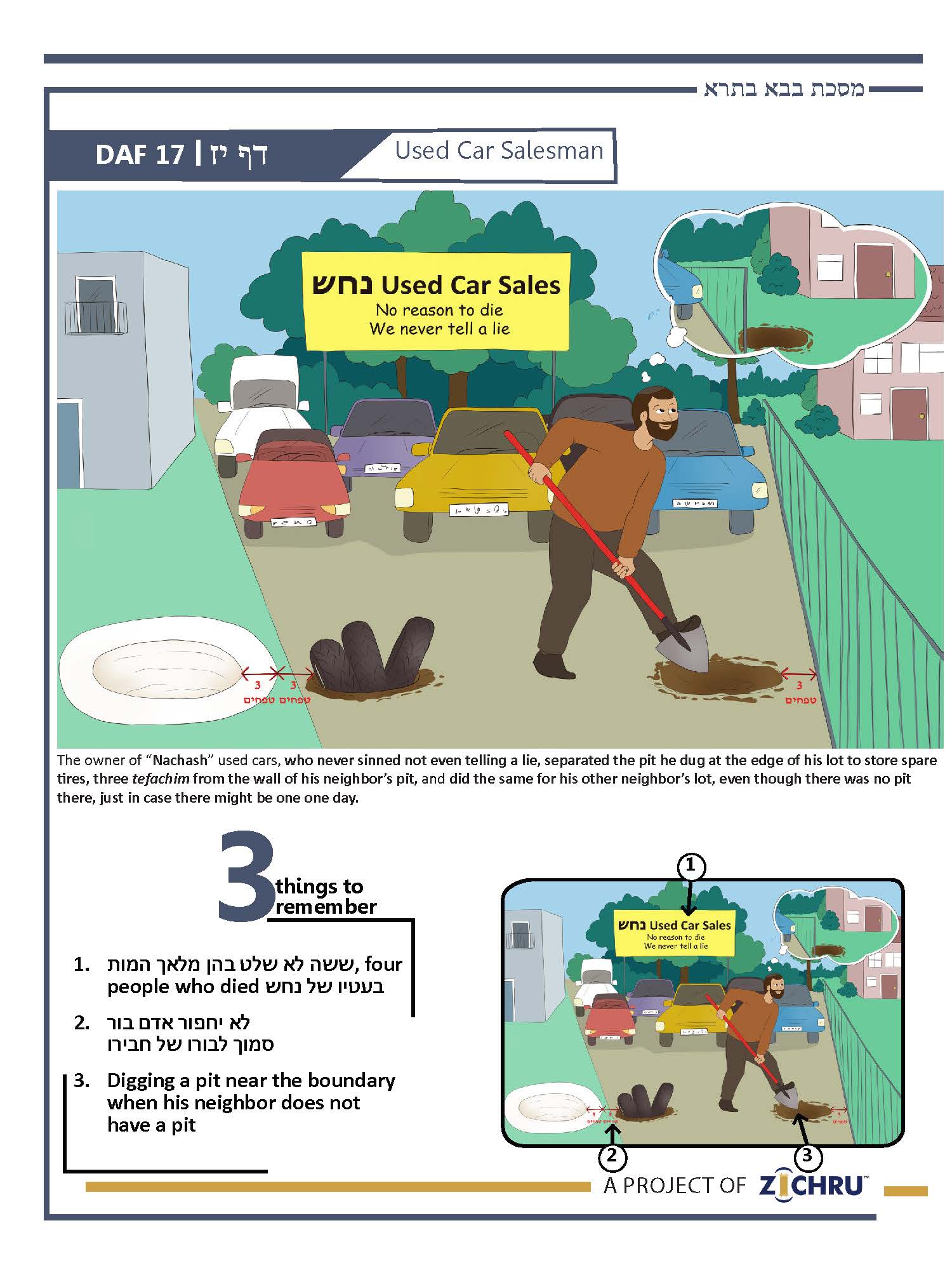Bava Basra - Daf 17
- Audio Timestamps
0:00 - The 3 Sugyos
3:07 - Review of 3 Sugyos
5:57- Siman
8:17 - 4 Blatt Back Chazarah
15:04 - Pop Quiz (Last 7 blatt)
For access to all Zichru resources including PDFs, and illustrations CLICK HERE
- ששה לא שלט בהן מלאך המות, four people who died בעטיו של נחש
In a Baraisa it was taught: ששה לא שלט בהן מלאך המות – For six people, the Angel of Death had no power over them, and they died by Hashem’s hand: Avraham, Yitzchak, Yaakov, Moshe, Aharon, and Miriam. The first three are derived from the expressions "בכל מכל כל" – with everything, from everything, everything, written by them respectively (Rashi explains they experienced every possible honor, including the death experience of those below). Regarding Moshe and Aharon, it is written: "על פי ה'" – literally by the mouth of Hashem, i.e., their death was through a “kiss” from Hashem. Miriam’s similar passing is derived from Moshe’s through a gezeirah shavah, but is not written explicitly because the expression would be inappropriate. Another Baraisa states: ארבעה מתו בעטיו של נחש – four people died because of the serpent’s advice to Adam to eat from the עץ הדעת, which condemned mankind to die. Otherwise, these four would not have died, because they were without sin: Yaakov’s son Binyomin, Moshe’s father Amram, Dovid’s father Yishai, and Dovid’s son Kilav. Most are known by tradition, but ישי is derived from a passuk referring to him as "נחש", because he died through the advice of the נחש.
- לא יחפור אדם בור סמוך לבורו של חבירו
The second Perek begins: לא יחפור אדם בור סמוך לבורו של חבירו – One cannot dig a pit in his own property near his neighbor’s pit, nor may he dig other types of ditches or holes, אלא אם כן הרחיק מכותל חבירו שלשה טפחים – unless he distances it three tefachim from his neighbor’s wall, וסד בסיד – and lines the pit with lime. The Mishnah lists numerous items which must be placed at a distance from his neighbor’s brick wall in order to avoid damaging it, such as olive refuse, seeds, a mill, and an oven.
The Gemara asks that the Mishnah says to distance one’s pit from his neighbor’s “wall,” although it is discussing his neighbor’s pit, and Abaye explains it means to distance his pit three tefachim from the wall of his neighbor’s pit (i.e., three tefachim of earth). The Mishnah used this expression to teach that the standard wall of a pit is three tefachim, which is relevant for one who sells someone “a pit and its walls.”
- Digging a pit near the boundary when his neighbor does not have a pit
הבא לסמוך בצד המצר – Regarding one who wants to [dig] a pit near the boundary of his neighbor’s property, before his neighbor’s property has a pit, Abaye says: סומך – he may [dig] it near the boundary without any distancing, but Rava says he cannot. Two version of this machlokes are given: (1) All prohibit digging near the boundary of a שדה העשויה לבורות – a field in which pits are normally dug, and they argue about a field in which pits are not normally dug. Rava holds his neighbor can say: כי היכי דאת אימלכת וחפרת – just as you reconsidered and dug a pit, against the norms of this field, אנא נמי ממלכנא וחפרנא – I might also reconsider and dig a pit, and you must distance yours to avoid damaging mine.
(2) All permit digging near the boundary of a שדה שאינה עשויה לבורות, and argue about a שדה העשויה לבורות. Abaye permits digging near the boundary, since his neighbor has no pit there now. Rava forbids it, even according to Rebbe Yose, who permits planting a tree near a neighbor’s pit, because in that case, the roots which will later cause damage do not yet exist. Here, the neighbor can say: כל מרא ומרא דקא מחיית – each time you strike the ground with your spade, קא מרפית לה לארעאי – you weaken my land!
Siman – Used Car Salesman
The owner of “Nachash Used Cars,” who never sinned, not even telling a lie, separated the pit he dug at the edge of his lot to store spare tires, three tefachim from the wall of his neighbor’s pit, and did the same for his other neighbor’s lot, even though there was no pit there, just in case there might be one in the future.


